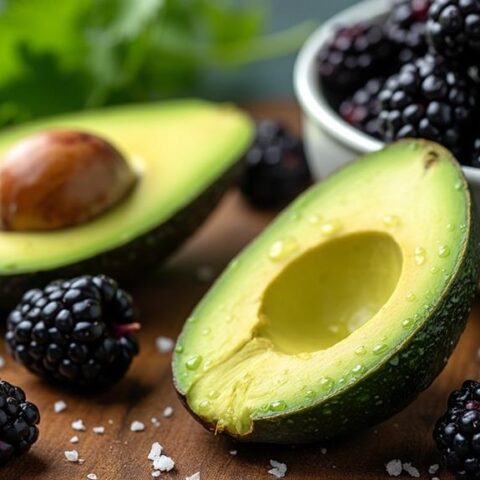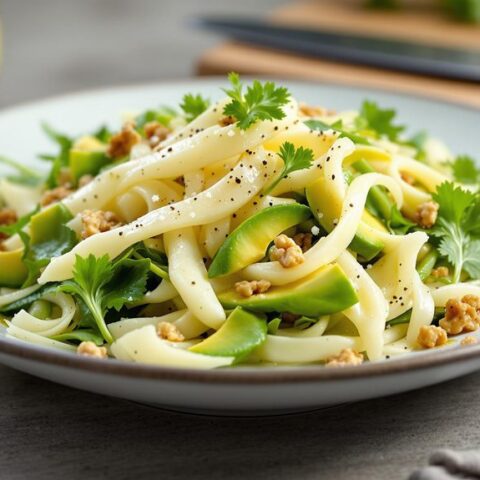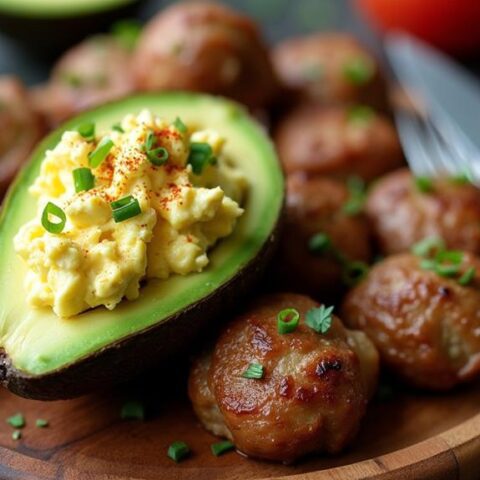
Turkey is keto-friendly primarily due to its very low carbohydrate content, with only 0.14 grams of net carbs per 100 grams, making it ideal for maintaining ketosis. It boasts a high protein level of 23.66 grams per 100 grams, supporting muscle building and tissue repair, essential for ketogenic diets. Turkey is also low in total fat, particularly saturated and trans fats, promoting heart health. Additionally, it is rich in essential vitamins like B-6 and B-12 and minerals such as iron and magnesium, enhancing overall health. These attributes make turkey a versatile ally in the pursuit of ketogenic goals, offering more insights upon exploration.
Key Takeaways
- Turkey's carbohydrate content is exceptionally low at 0.14 g per 100 g, ideal for maintaining ketosis.
- High protein content of 23.66 g per 100 g supports muscle building and maintenance.
- Low-fat content with minimal saturated and trans fats promotes heart health.
- Rich in essential vitamins and minerals, enhancing metabolic health and immune function.
- Versatile culinary applications make turkey easy to incorporate into keto meal plans.
Keto Benefits of Turkey
Turkey offers significant advantages for individuals adhering to a ketogenic diet, primarily due to its favorable macronutrient profile. With a mere 0.14 g of net carbs per 100 g, turkey is an excellent choice for those aiming to maintain ketosis—a metabolic state vital for the keto diet, where daily carbohydrate intake is restricted to 20-50 g.
This low-carb diet is additionally supported by turkey's high protein content of 23.66 g per 100 g, which aids in muscle building and tissue repair, essential components for individuals committed to a ketogenic lifestyle. Moreover, turkey's protein content helps maintain amino acid balance, vital for muscle maintenance and recovery during ketosis.
Moreover, turkey's low glycemic index of zero guarantees minimal impact on blood sugar levels, thereby stabilizing insulin and promoting efficient fat burning—a key objective for those on a keto diet.
The healthy fat content in turkey, characterized by low levels of saturated and trans fats, supports a favorable lipid profile, aligning with heart health goals common among keto dieters.
Additionally, turkey's inherent versatility in preparation and recipe adaptability makes it an easy and enjoyable component of a balanced keto meal plan, facilitating long-term adherence to this low-carb dietary approach.
Turkey's Nutritional Profile
The nutritional composition of turkey exemplifies its suitability for a ketogenic diet, characterized by its exceptionally low carbohydrate content of only 0.14 g per 100 g. Such a negligible amount of net carbs makes turkey an ideal protein source for those adhering to a keto regimen, where minimizing carbohydrate intake is essential.
Additionally, turkey offers a robust protein content of 23.66 g per 100 g, effectively supporting muscle synthesis and tissue repair without compromising the low-carb requirements of a ketogenic diet. Compared to ground turkey, which provides 23.3g of protein per serving, turkey in general offers a similar protein profile, making it versatile for various keto-friendly dishes.
Though the total fat content of turkey stands at a modest 1.48 g per 100 g, this can be complemented with healthy fats to meet the energy demands of a keto diet. Despite its low-fat profile, turkey remains a rich source of essential vitamins such as B-6 (0.813 mg) and B-12 (0.63 µg), which facilitate energy metabolism and maintain nerve function, both vital for individuals on a keto diet.
The mineral composition further enhances turkey's nutritional profile, providing iron (0.73 mg) and magnesium (28.0 mg), which are integral to overall health. These elements support cellular function and energy production, aligning with the nutritional requisites of a low-carb dietary framework.
Health Considerations
Given its remarkable nutritional profile, turkey stands out as a practical choice for those adhering to a ketogenic diet. With only 0.14 g of net carbs per 100 g, turkey is a quintessential low carb food, making it ideal for maintaining ketosis, a metabolic state essential for the success of a keto diet.
The high-quality protein content, at 23.66 g per 100 g, further enhances its suitability by supporting muscle building and tissue repair, which are important for overall health and physical performance. Additionally, turkey's role in supporting improved insulin sensitivity can be beneficial for managing type 2 diabetes, as the ketogenic diet is known to stabilize blood glucose levels and enhance metabolic health.
In addition to its macronutrient benefits, turkey is a significant source of essential vitamins and minerals such as iron, zinc, and magnesium. These nutrients are critical for various bodily functions, including oxygen transport, immune support, and enzymatic reactions, all of which are particularly pertinent for individuals following a ketogenic diet.
Turkey's low saturated fat and minimal trans fat content contribute to a favorable lipid profile, potentially reducing the risk of cardiovascular disease. However, it is important to be discerning when selecting turkey products, as processed variants can be high in sodium, posing a risk of hypertension.
As a result, opting for minimally processed turkey is advisable to maximize its health benefits.
Keto-Friendly Meat Options
Among the various meat options suitable for a ketogenic diet, low-carb selections such as turkey, chicken, pork, and lamb stand out for their nutritional profiles.
Turkey, in particular, is an exemplary choice for those adhering to a ketogenic diet due to its minimal carbohydrate content, registering only 0.14 g net carbs per 100 g. This makes turkey an ideal option for maintaining low carb intake, a fundamental aspect of the ketogenic dietary framework. Furthermore, turkey's high protein content supports insulin regulation and appetite control, which are crucial components of the keto diet. Its versatility allows for a wide range of culinary applications, further enhancing its appeal.
Chicken, another low-carb meat, offers a similar nutritional advantage, making it a staple in ketogenic meal planning.
Pork provides various cuts that cater to different flavor preferences while keeping carb intake in check. Lamb, celebrated for its rich taste, is another robust option for keto practitioners seeking variety. Additionally, beef serves as a high-quality protein source, aligning with keto guidelines by delivering essential nutrients without compromising carbohydrate restrictions.
Incorporating ground turkey, free from fillers and additives, can further diversify keto meals.
Including fish like salmon and alternatives such as tofu can enhance dietary diversity, ensuring nutritional balance while adhering to the low-carb, high-fat principles of the ketogenic diet.
Cooking Turkey for Keto
While adhering to a ketogenic diet, cooking methods for turkey should prioritize maintaining its low-carb profile, such as roasting, grilling, or sautéing.
Incorporating healthy fats like avocados and olive oil can enhance both flavor and nutrition, aligning with keto principles. These techniques preserve the nutritional integrity of turkey, making it a vital choice for keto-friendly meals.
Avoiding high-carb ingredients like breading or sugary marinades guarantees the dish remains within the dietary guidelines. Instead, incorporating natural fats, such as olive oil or butter, not only enhances the flavor but also aids in meeting the higher fat requirements of a ketogenic regimen.
Ground turkey is particularly versatile and can be utilized in a variety of low-carb recipes. It is essential, however, to verify that the ground turkey is free from fillers or additives that could inadvertently increase carbohydrate content.
Additionally, utilizing spices and herbs can greatly enhance the taste without compromising the low-carb nature of the dish, as they typically contain negligible carbohydrates.
To summarize, maintaining a keto-friendly approach to cooking turkey involves:
- Avoiding high-carb ingredients: Verify no breading or sugary marinades are used.
- Incorporating healthy fats: Use olive oil or butter to add flavor and meet fat needs.
- Choosing additive-free products: Verify ground turkey is free from carb-increasing fillers.
- Utilizing spices and herbs: Enhance flavor without adding carbs.
Low-Carb Turkey Snacks
Low-carb turkey snacks, such as turkey jerky, homemade turkey wraps, and turkey roll-ups, offer versatile options that are suitable for maintaining a ketogenic diet.
These snacks provide a substantial source of protein, essential for muscle maintenance and promoting satiety, while typically containing only 2-5 grams of net carbs per serving.
When choosing or preparing these snacks, it is vital to prioritize options that are free from added sugars and unhealthy preservatives to support a healthy keto lifestyle.
These snacks also contribute to better metabolic health by aiding in appetite regulation and reducing ghrelin levels, thereby enhancing feelings of fullness.
Turkey Jerky Options
When considering low-carb snacks for a ketogenic diet, turkey jerky emerges as a viable option due to its nutritional profile. Turkey jerky typically contains 2-5 grams of net carbs per serving, making it an ideal low-carb snack for those aiming to control their daily net carb intake.
It provides a substantial protein content, generally between 10-15 grams per serving, which supports muscle maintenance and enhances satiety. Additionally, turkey jerky is often lower in fat compared to its beef counterpart, offering a leaner protein source without compromising the ketogenic principles.
However, it is essential to be vigilant about added ingredients in turkey jerky products. Some commercially available options may contain undesirable elements such as maltodextrin or brown sugar, which can inadvertently increase the carbohydrate content.
As a result, reading labels to choose preservative-free varieties, seasoned with natural spices, is imperative to maintain adherence to keto dietary goals.
- Net Carbs: Typically, 2-5 grams per serving, suitable for keto
- Protein Content: Provides 10-15 grams per serving, aiding satiety
- Fat Content: Lower than beef, offering lean protein
- Added Ingredients: Check for sugars and preservatives to avoid excess carbs
Homemade Turkey Wraps
As turkey jerky serves as a convenient low-carb snack, another excellent option for those adhering to a ketogenic diet is homemade turkey wraps. These wraps can be crafted using either lettuce leaves or low-carb tortillas, both of which help maintain minimal net carbohydrates, vital for a ketogenic lifestyle.
With turkey containing just 0.14 g net carbs per 100 g, these wraps can be easily integrated into a low-carb meal plan without surpassing daily carb limitations.
Moreover, turkey is an excellent source of protein, offering 23.66 g per 100 g, which aids in muscle maintenance and promotes satiety—an important aspect for those seeking filling snack options.
To enhance the flavor profile while keeping carbohydrate content low, ingredients such as cream cheese, avocado, or cheese can be incorporated. This customization not only enhances taste but guarantees compatibility with ketogenic dietary requirements.
To further optimize nutrient intake, various low-carb vegetables like bell peppers or cucumbers can be added to the wraps. These additions contribute essential vitamins and minerals without noticeably impacting the low-carb nature of the snack.
Therefore, homemade turkey wraps provide a versatile, satisfying, and nutritionally sound choice for anyone committed to a ketogenic lifestyle.
Turkey Roll-Up Ideas
Turkey roll-ups provide a practical and nutritious snack alternative for individuals adhering to a ketogenic diet. With each 100 grams of turkey containing merely 0.14 grams of net carbs, these roll-ups fit seamlessly into low-carb meal plans, allowing for substantial portions without exceeding daily carbohydrate limits.
The incorporation of healthy fats such as cream cheese or guacamole not only enhances flavor but also fulfills the dietary fat requirements essential for maintaining ketosis.
The versatility of turkey roll-ups allows them to be tailored with various low-carb fillings, creating a diverse range of snack options. Utilizing ingredients such as spinach, bell peppers, or olives introduces additional nutrients and flavors while keeping the carbohydrate content minimal.
Moreover, spices and condiments like mustard can be added to amplify taste without compromising the snack's ketogenic compliance.
Below are some innovative turkey roll-up combinations:
- Turkey, Cream Cheese, and Olive: A savory combination that offers a balance of protein, fat, and flavor.
- Turkey, Avocado, and Spinach: Rich in healthy fats and micronutrients, ideal for sustaining energy levels.
- Turkey, Bell Peppers, and Mustard: Provides a crunchy texture with a tangy kick.
- Turkey, Guacamole, and Cucumber: Invigorating and satisfying, perfect for a quick low-carb snack.
These options exemplify how turkey roll-ups can serve as a convenient, low-carb snack solution for keto enthusiasts.
Turkey Meal Planning Tips
Effective turkey meal planning on a keto diet involves strategic portion control, ensuring ideal nutrient intake and variety.
Turkey is almost carb-free and high in quality protein, making it an excellent choice for maintaining ketosis.
Pairing turkey with leafy greens like spinach or kale can provide essential vitamins while keeping carb counts low.
Employ balanced pairings by combining turkey with nutrient-dense, low-carbohydrate vegetables to maintain macronutrient ratios.
Utilize versatile cooking methods such as roasting, grilling, or incorporating turkey into various dishes to enhance flavor and dietary adherence.
Portion Control Strategies
For those adhering to a ketogenic diet, precise portion control is vital when incorporating turkey into meal plans. To maintain ketosis efficiently, aim for turkey servings of approximately 100-150 grams. This portion size provides about 23-35 grams of protein and a mere 0.14 grams of net carbohydrates, aligning with the target of 20-30 grams of net carbs per day.
Such meticulous portion control is significant in managing overall macronutrient intake, as it guarantees that protein consumption is adequate without exceeding carbohydrate limits.
Implementing meal prep strategies can further facilitate adherence to dietary goals. Preparing turkey dishes in advance, such as grilled turkey breasts or turkey salads, offers convenient, portion-controlled meals ready throughout the week.
Utilizing a food scale is recommended for accurately measuring turkey portions, thereby aiding in precise macronutrient tracking.
To enhance dietary variety without compromising portion control, consider varying your cooking methods. Roasting, grilling, or incorporating ground turkey into keto-friendly recipes can prevent monotony.
Additionally, pairing turkey with low-carb vegetables like spinach or broccoli can boost nutrient intake while maintaining low carbohydrate levels.
- Aim for 100-150 grams of turkey per meal.
- Use a food scale for accurate measurements.
- Prepare turkey meals in advance.
- Pair turkey with low-carb vegetables.
Balanced Nutrient Pairings
How can one optimize turkey meals to align with the ketogenic diet while guaranteeing balanced nutrient intake? Turkey, naturally low in fat, can be paired with healthy fats to enhance satiety and nutrient absorption, vital for a keto-friendly approach. Avocado or olive oil can complement turkey dishes effectively, offering monounsaturated fats that promote cardiovascular health and support ketosis.
Incorporating low-carb vegetables such as spinach or broccoli alongside turkey guarantees fiber intake while complying with carb limits. These vegetables provide essential micronutrients and fiber, contributing to digestive health without exceeding the carbohydrate restrictions of a ketogenic diet.
Adding high-fat cheeses, such as mozzarella or feta, to turkey meals can further enrich the flavor profile and provide additional fats necessary for maintaining ketosis.
Seasoning turkey with herbs and spices is recommended, as they offer robust flavors without adding carbohydrates, aligning with dietary goals.
Additionally, integrating turkey into salads using leafy greens, nuts, and keto-friendly dressings can create a balanced meal, blending protein and fats while adhering to low-carb principles. This method not only enhances the palatability of turkey meals but also guarantees nutritional equilibrium, making turkey an ideal protein source in a ketogenic meal plan.
Versatile Cooking Methods
Adaptability is a cornerstone of successful meal planning, especially when incorporating turkey into a ketogenic diet. Turkey's versatile cooking methods, such as roasting, grilling, or sautéing, provide a multitude of low-carb meal options. These methods not only preserve the nutrient integrity of turkey but also align with the dietary requirements of a keto lifestyle.
Turkey, a low-carb protein source, can be seamlessly integrated into various dishes, promoting both flavor diversity and nutritional balance.
Ground turkey stands out as a particularly flexible ingredient. When used without fillers, it forms the basis for keto-friendly recipes such as turkey burgers or meatballs. This adaptability facilitates the creation of nutrient-rich meals that support ketosis.
- Roasting, grilling, or sautéing: Maintains low-carb integrity and offers flavor diversity.
- Ground turkey versatility: Ideal for burgers or meatballs, providing essential proteins.
- Integration into diverse dishes: Easily added to salads, stir-fries, or casseroles.
- Substitution for higher-carb meats: Supports ketosis and enhances nutrient intake.
Furthermore, turkey serves as an efficient meal-prepping option, ensuring portion control and availability of keto-friendly meals throughout the week. This strategic approach helps maintain dietary goals while enjoying turkey's nutritional benefits.
Frequently Asked Questions
Is Turkey Ok on a Keto Diet?
Turkey is an excellent addition to a keto meal due to its low net carbs and glycemic index. It provides high-quality protein, essential for muscle maintenance, while allowing flexibility to incorporate healthy fats as needed.
What Meat Is Best for Ketosis?
For ideal ketosis, choose turkey cuts due to their low carb and high protein content. Consider cooking methods that retain nutritional value, such as grilling or baking. Complement turkey with other protein sources, mindful of fat content.
Why Does Turkey Have Carbs?
Turkey nutrition reveals minimal carbohydrates due to its primary composition as a protein source. This aligns with dietary guidelines emphasizing low carb benefits. The trace carb content does not greatly affect its suitability for low-carb or ketogenic diets.
Why Is Turkey Healthier Than Bacon?
Turkey is healthier than bacon due to its numerous benefits, including higher protein content, lower saturated fat, and absence of harmful preservatives. These factors contribute to better heart health and overall nutritional profile compared to bacon's drawbacks.
Conclusion
Turkey is a suitable option for ketogenic diets due to its high protein content and low carbohydrate levels. The nutritional profile of turkey offers essential nutrients such as vitamins B6 and B12, zinc, and selenium, which support metabolic processes and immune function. When selecting keto-friendly meats, turkey stands out for its versatility and health benefits. Incorporating turkey into meal planning and snacks can effectively support dietary goals, providing both nutritional value and adherence to low-carbohydrate requirements.









No Comments